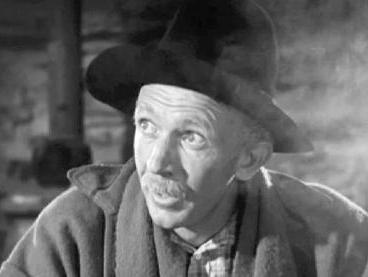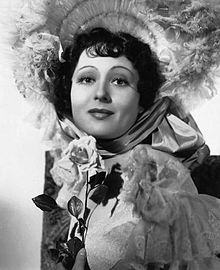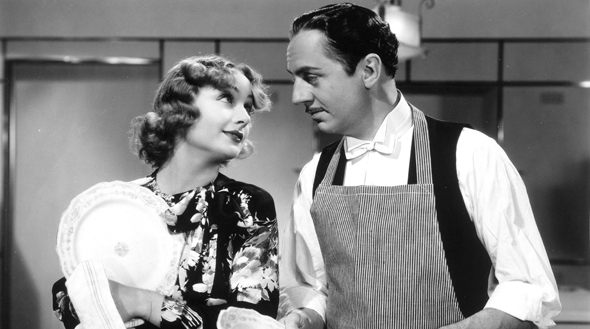 |
| Paul Muni: Best Actor for The Story of Louis Pasteur |
TUESDAYS WITH OSCAR: 1936
Now for the Ninth Academy Awards, we find that spectacle trumps laughter. And what a spectacle: while not remembered today, The Great Ziegfeld certainly is nothing but lavish. It is like someone brought the entire Ziegfeld Follies to your hometown, complete with its stars (Fanny Brice, Ray Bolger) and some great facsimiles (Eddie Cantor, Will Rogers).
These awards also rectified what had been a growing issue when they introduced the Best Supporting Actor and Actress category. Now actors with smaller but still impressive roles could be singled out. In the first few years of the Supporting categories, the winners got a plaque rather than an actual Oscar statuette, which I think is rather bizarre. That too would be rectified.
Given the new categories, I have opted to rework the Tuesdays with Oscar retrospective. I will have the categories first with the Official Winners, then My Choice from the Official Nominees, and finally My Personal Choices. It's simply too much to have it the other way.
As always this is just for fun and should not be taken as my final decision. I should like to watch all the nominees and winners before making my final, FINAL choice. Now, on to cataloging the official winners (in bold) and my selections (in red). Also, my substitutions (in green).
THE 1936 ACADEMY AWARD WINNERS
BEST SUPPORTING ACTRESS
Beulah Bondi (The Gorgeous Hussy)
Alice Brady (My Man Godfrey)
Bonita Granville (These Three)
Maria Ouspenskaya (Dodsworth)
Gale Sondergaard (Anthony Adverse)
I don't think people remember Anthony Adverse at all. My guess as to why Sondergaard won is because as far as I know, she played an evil character, and the Academy can rarely resist evil, especially over comic. She was the duplicitous maid in this sprawling film, so that I think got her over the top.
Sadly, Sondergaard was hit with something of an Oscar Curse. She was originally set to be the Wicked Witch of the West in The Wizard of Oz but after attempting to downplay her beauty (as the character was first pictured to be a seductive beauty and not the old hag she became) she opted not to take the part and said she had no regrets about it. Later on, the Hollywood Blacklist all but derailed her film career and while she mounted half-hearted comebacks her career never fully recovered.
Beulah Bondi (The Gorgeous Hussy)
Alice Brady (My Man Godfrey)
Bonita Granville (These Three)
Maria Ouspenskaya (Dodsworth)
Gale Sondergaard (Anthony Adverse)
I think that for the moment, my choice would be Brady. I have a soft spot for fluttering wealthy matrons, and I think that Brady's loss showed that the Academy has gotten into a mindset that comedy isn't as award-worthy as drama. Still, the proof is in the pudding, and I think it is My Man Godfrey that is remembered today.
No Substitutions.
BEST SUPPORTING ACTOR
Michael Auer (My Man Godfrey)
Walter Brennan (Come and Get It)
Stuart Erwin (Pigskin Parade)
Basil Rathbone (Romeo and Juliet)
Akim Tamiroff (The General Died at Dawn)
Walter Brennan had started out as an Extra, and if memory serves correct the Academy allowed the Screen Extras Guild to vote. The affection they had for 'one of their own who made it big' made Brennan a multiple Oscar-winner, scoring three Best Supporting Actor Oscars in his career, including the first one given. Whether he deserved so many is a subject of debate.
Michael Auer (My Man Godfrey)
Walter Brennan (Come and Get It)
Stuart Erwin (Pigskin Parade)
Basil Rathbone (Romeo and Juliet)
Akim Tamiroff (The General Dies at Dawn)
Perhaps Rathbone was too old to play Tybalt, the cousin of Juliet whose death at the hands of Romeo brought down the great love story. However, given that EVERYONE in the cast was far too old to be believable we can overlook that. If anyone really specialized in evil, imperious characters it was Rathbone, but give him the credit he deserves: apart from Jeremy Brett I don't think anyone else has captured the role of Sherlock Holmes as well as he.
Sorry, Benedict.
No Substitutions.
BEST ACTRESS
Irene Dunne (Theodora Goes Wild)
Gladys George (Valiant is the Word for Carrie)
Carole Lombard (My Man Godfrey)
Luise Rainer (The Great Ziegfeld)
Norma Shearer (Romeo and Juliet)
Lordy, Lordy, were they nuts!
Luise Rainer, as of today, is the oldest Oscar winner still alive at an incredible 104 (!) years old. That's right: she has outlasted almost all her contemporaries. Off the top of my head, only Carla Laemmle (also 104), who had small roles in the Lon Chaney silent version of The Phantom of the Opera and spoke the first line in the Bela Lugosi version of Dracula, is still around to remember how it was.
I'm sure Rainer is an extremely nice lady. I don't think I have heard anything negative about The Viennese Teardrop as a person. As an actress... It seems unfair to beat up on a very old lady, but having seen her in The Great Ziegfeld, a few things come to mind. First, she is not the leading role. At most, she should have been in the Supporting Actress category. Second, it is a pretty bad performance. I could never figure out of her character (Anna Held, the first Mrs. Ziegfeld) was suppose to be an idiot or not. She was excessively fluttery and mannered in the film, and her dialogue sometimes came across as making her dim-witted. When she sees a card signed 'Florenz Ziegfeld, Jr.', she asks her maid if the "Junior" bit mean that he's a little boy. Another actress (say her Great Ziegfeld costar Myrna Loy) might have made this come off as a sharp and witty remark. She makes it sound as if she's genuinely wondering if a child is writing her job offers.
Finally, her final scene, a telephone call where she says goodbye to Ziggy, earned a notorious reputation. MGM trumpeted that this scene was used in acting classes, dissected and studied. The telephone scene, from what I understand, was indeed studied in acting classes...as an example of what NOT to do.
Irene Dunne (Theodora Goes Wild)
Gladys George (Valiant is the Word for Carrie)
Carole Lombard (My Man Godfrey)
Luise Rainer (The Great Ziegfeld)
Norma Shearer (Romeo and Juliet)
Again, what were they thinking? You have some really great comic performances this year. Theodora Goes Wild is I think Dunne's first comic role, which led her to become one of the great screwball comedy actresses. As much as I love Dunne, the one that has always stood out has been the beautiful Lombard as the debutante in turns silly and serious whom we all end up falling for. My Man Godfrey is the film that has stood the test of time, and Lombard I don't think was ever better or lovelier.
Lombard was just as witty off-screen as she was on. Wearing a black mink coat when World War II began, she said she came dressed as a blackout. Six years after My Man Godfrey, Carole Lombard was killed in a plane crash at age 33 while on a war bonds drive, a terrible ending to a simply beautiful person (in every way) and one of greatest losses to film.
I can't say anything for or against George, but Rainer was pretty bad and the 34-year-old Shearer as the 13-year-old girl? Lordy, Lordy, were they nuts!
SUBSTITUTIONS
Jean Arthur (Mr. Deeds Goes to Town)
Irene Dunne (Theodora Goes Wild)
Greta Garbo (Camille)
Carole Lombard (My Man Godfrey)
Ginger Rogers (Swing Time)
For the moment, Lombard is still too enchanting to ignore, but when you look at Garbo in one of her signature roles and the only-once nominated Arthur, how sad they opted for overdramatics that year.
BEST ACTOR
Gary Cooper (Mr. Deeds Goes to Town)
Walter Huston (Dodsworth)
Paul Muni (The Story of Louis Pasteur)
William Powell (My Man Godfrey)
Spenser Tracy (San Francisco)
First, let me state for the record, I love milk, so thank you, Dr. Pasteur.
Paul Muni was the King of Biopics. He was so well-regarded for his 'acting' that he was billed as MR. Paul Muni in almost all his films. Aside from being Dr. Pasteur, he would go on to play another Frenchman in The Life of Emile Zola and bizarrely (to me at least) both the Mexican Indian President in Juarez and a Chinese peasant in The Good Earth.
Granted, I don't know many Mexicans or Chinese who grew up speaking Yiddish, but that's not for me to say.
Interestingly, while The Story of Louis Pasteur is pretty much forgotten (and frankly, sounds a little boring, but I can't say for sure), his most famous role, that of the gangster Tony Camonte in the original Scarface, did not receive an Oscar nomination.
Gary Cooper (Mr. Deeds Goes to Town)
Walter Huston (Dodsworth)
Paul Muni (The Story of Louis Pasteur)
William Powell (My Man Godfrey)
Spenser Tracy (San Francisco)
Maybe Powell made it look too easy, too effortless, as if he weren't really acting but was playing himself. I can't think of a reason why Powell failed to win, apart from the fact that the Academy, again, thinks being 'dramatic' is more impressive than being 'comedic'.
SUBSTITUTIONS
Fred Astaire (Swing Time)
Gary Cooper (Mr. Deeds Goes to Town)
Humphrey Bogart (The Petrified Forest)
Charles Chaplin (Modern Times)
William Powell (My Man Godfrey)
Bogart really broke through as the murderous Duke Mantee in The Petrified Forest, and Chaplin's Modern Times was the last time we really saw The Little Tramp (The Great Dictator having Chaplin play a version of the Tramp along with the Hitler parody). All great performances, but my heart still remains with Powell's turn as another tramp of sorts.
BEST SONG
Did I Remember (Suzy)
I've Got You Under My Skin (Born to Dance)
A Melody from the Sky (Trail of the Lonesome Pine)
Pennies from Heaven (Pennies from Heaven)
The Way You Look Tonight (Swing Time)
When Did You Leave Heaven? (Sing, Baby, Sing)
You've got three legendary songs on the list, so how to choose? I've Got You Under My Skin and Pennies from Heaven are now standards, and both are excellent songs. However, for me, one of the Ten Best Best Original Song winners is this year's, so beautiful and tender and romantic.
From Swing Time: The Way You Look Tonight, music by Jerome Kern, lyrics by Dorothy Fields.
BEST DIRECTOR
Frank Capra (Mr. Deeds Goes to Town)
Gregory La Cava (My Man Godfrey)
Robert Z. Leonard (The Great Ziegfeld)
W.S. Van Dyke (San Francisco)
William Wyler (Dodsworth)
In a break with tradition, Capra won his second Oscar for a comedy. It's a break because both in the past and future the Academy tends to go for dramas, so a comedy winning anything, especially a big prize is a surprise. Capra, curiously enough, is the only past winner on the list, and out of all of his competitors, Wyler is the only one to go on to win in the future. Even more curious, Wyler would tie Capra with three Best Director Oscars himself.
Frank Capra (Mr. Deeds Goes to Town)
Gregory La Cava (My Man Godfrey)
Robert Z. Leonard (The Great Ziegfeld)
W.S. Van Dyke (San Francisco)
William Wyler (Dodsworth)
One can't ignore how well La Cava kept things flowing in one of the great screwball comedies, one with real social conscious too.
SUBSTITUTIONS
Frank Capra (Mr. Deeds Goes to Town)
Charles Chaplin (Modern Times)
George Cukor (Camille)
Gregory La Cava (My Man Godfrey)
George Stevens (Swing Time)
I can't say that I was wild about Modern Times when I first saw it, but there are moments and images that still stir the viewer. I think I should rewatch it, but for now, I am sticking with it.
BEST PICTURE
Anthony Adverse
Dodsworth
The Great Ziegfeld
Libeled Lady
Mr. Deeds Goes to Town
Romeo and Juliet
San Francisco
The Story of Louis Pasteur
A Tale of Two Cities
Three Smart Girls
Some are pretty forgotten (even the actual winner). Out of all the nominees for 1936, I think Libeled Lady, Mr. Deeds Goes to Town, San Francisco, and maybe A Tale of Two Cities would be recognized. Out of those four, I think only Mr. Deeds Goes to Town would be the one people would even watch today (though the climatic, albeit wildly historically inaccurate earthquake sequence in San Francisco is still pretty awesome).
The Great Ziegfeld is if nothing else, lavish. Near the end of the first half of the film (it's an extremely long movie, unnecessarily so), we get the A Pretty Girl is Like a Melody number, which even today is still pretty impressive. Made up of two long takes, it holds our attention and is grand. I'll give 'em that.
My Choice for Best Picture of 1936 from the nominees...
Anthony Adverse
Dodsworth
The Great Ziegfeld
Libeled Lady
Mr. Deeds Goes to Town
Romeo and Juliet
San Francisco
The Story of Louis Pasteur
A Tale of Two Cities
Three Smart Girls
From the available list I think it's pretty hard to find something I think is really fantastic. That being said, I'm going for the Capra-corn.
And now, MY Choice for the Best Picture of 1936 from My List of Nominees...
Camille
Fury
Modern Times
My Man Godfrey
Swing Time
Sad that out of all these films, none were nominated while things like the vanity project Romeo and Juliet were. Nothing against Deanna Durbin, but does anyone really remember Three Smart Girls? Each of the five listed films has stood the test of time and is generally considered a classic. My Man Godfrey received nominations in all four acting categories and lost all four acting categories (a feat not to be repeated until American Hustle this year). It also lost all six of its nominations, an astonishing situation and an embarrassment to the Academy.
Really: Luise Rainer over Carole Lombard?
Paul Muni over William Powell?
Lordy, Lordy, were they nuts!
Next week, the 1937 Oscars.












Lordy, lordy, your personal biases are showing. When it comes to film criticism, you have to leave them at the door, Rick. Whether or not a film is forgotten today is not criteria for judging its artistic worth. "My Man Godfrey" might be lovely escapist entertainment, but your showering it with Oscars is a bit of a stretch.
ReplyDeleteI will not deny being slightly biased in favor of certain nominees, but I find little to persuade me to change. That being said, perhaps visiting/revisiting these films will give me a different perspective.
Delete